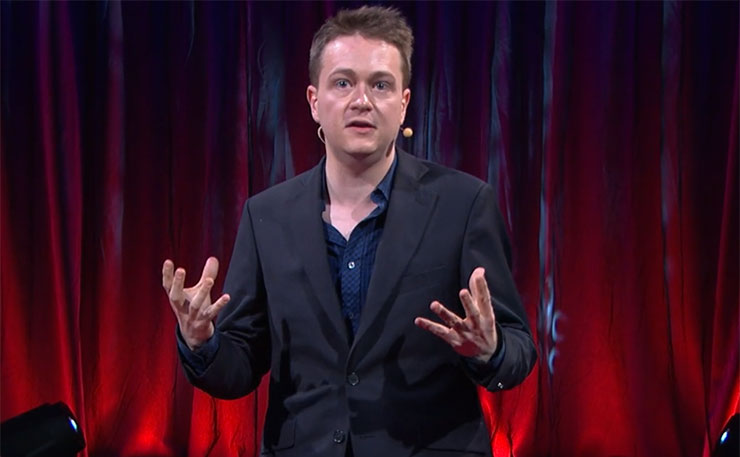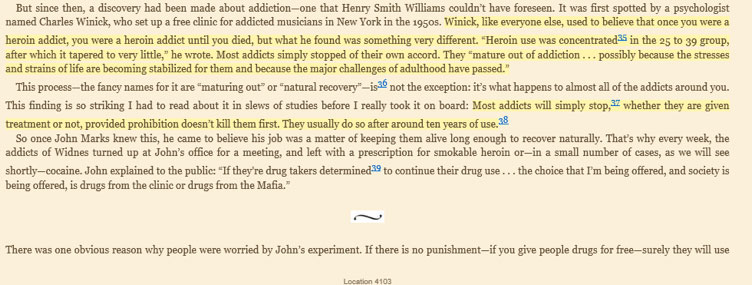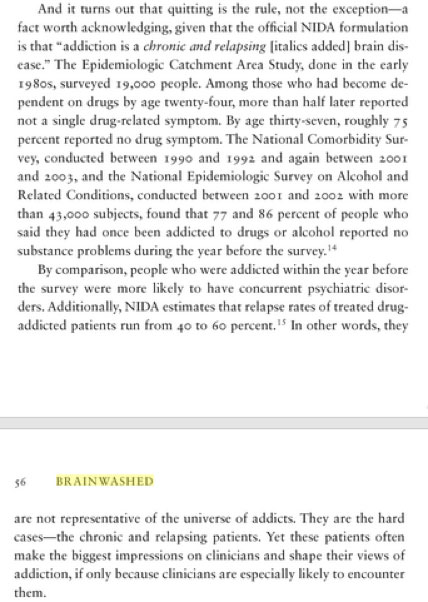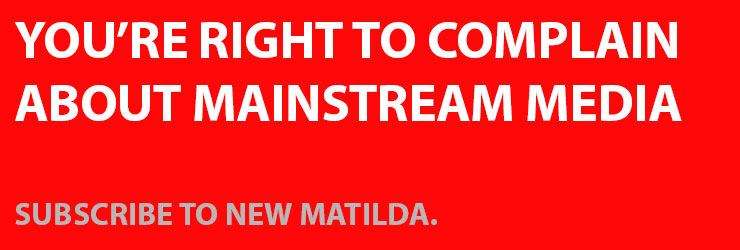This is the final article in a four part New Matilda series by Michael Brull, reviewing Chasing the Scream, a book by journalist Johann Hari that examines the ‘War on Drugs’. In this article, Brull looks at the credibility of the author.
As noted by the length of this review, I think there is a lot in this book that warrants attention. Yet I do have some reservations.
If Chasing The Scream carefully reviewed the scientific literature on drugs and addiction, it would probably be a less interesting and engaging book. By going to different countries, interviewing gangsters and cops, and researching Billie Holiday, Hari offers a more exciting collection of stories.
But he does not present enough evidence for readers to be sure that what he claims is correct.
For example, Hari cites the work of Mate and Alexander. At one point, he specifically celebrates the work of what he identifies as a “small band of dissident scientists” on addiction. If they are a small band of dissidents, then shouldn’t we be told what the rest of the scientists researching the issue think? What criticisms do they make of Mate and Alexander?
Hari doesn’t present that point of view. It is possible that they are wrong. However, to cherrypick the views of scientists he agrees with, and ignore any counterarguments is problematic.

Leftists often complain that those who deny climate change, or evolution, don’t really get how science works, because they are ignoring the preponderance of scientific evidence. Hari makes no attempt to present scientific debate in any systematic way.
Hari claims that dissenting research on drugs doesn’t get any funding, which is why his favoured academics are ignored. Perhaps this is the case, but this is mostly argued through assertion rather than demonstrated.
I am not an expert in the field. It is possible that Hari is right, and all the evidence points to his position. Yet a brief google search shows critiques of the work of Mate, like at Psychology Today.
What Hari says about addiction might be interesting, but it might also be incorrect, or incomplete.
Seth Mnookin, a professor of science writing at the Massachusetts Institute of Technology, formed a similar impression. Identifying the book as a “partisan polemic”, Mnookin complains that Hari doesn’t look at the work of his favoured researchers “through a critical lens”, arguing that there is a “significant body of work demonstrating” the “shortcomings” of Mate’s work.
Mnookin mostly doesn’t explain his criticisms, but he argues that “Hari acts as if a rigid, deterministic model of addiction as a purely physical disease is almost universally accepted; if anything, the opposite is true.”
In this comment, Mnookin seems to concede that Hari’s rejection of the “purely physical disease” model is in line with mainstream scientific thought on this issue. Yet what that literature actually shows isn’t explored in Hari’s book.
Hari does not just lean on favoured sources on addiction. Though there are hundreds of endnotes, in the chapters that cite books, they usually repeatedly cite the same handful of books over and over.
Hari’s footnoting system is also a little strange. In the middle of sentences, a footnote will appear, leaving it unclear to readers precisely what the footnote is supposed to establish. For example, this is a passage from the book and the relevant endnotes. In it, Hari discusses “what happens to almost all of the addicts around you” – they naturally recover, as proven in “slews of studies” Hari read which convinced him.


Footnote 36 seems to direct readers to sources on what natural recovery is – referring readers to a book on the treatment of alcohol problems, and another one, discussed below. Hari then cites a source – footnote 37 – on the claim that most addicts will simply stop, in a sentence claiming there are “slews of studies” to prove this point.
This footnote directs readers to a single page of a book. “They usually do so after around ten years of use” refers readers to footnote 38, a single page of another book.
The fact that none of these references guide readers to the “slews of studies”, in and of itself is concerning.
The Will Self book Junk Mail reference appears to guide readers to something he wrote about his visit to Alice Springs, called “The Red Centre”.
I haven’t checked whether it includes slews of studies about drug addiction. Amazon let me have a look at page 52 of Miller’s Case for Legalizing Drugs (one page before the one Hari cites). It says, “Many drug addicts, perhaps most, cure themselves”. This seems a bit more equivocal than Hari’s claim of what happens to “almost all” addicts.
Miller says Rufus King and Lawrence Kolb both conducted research which was consistent with this position, before citing anecdotes of addicts with experiences of natural recovery.
Though the place where footnote 36 was put doesn’t indicate that it’s the source of Hari’s “slews of studies”, I checked it anyway. The second source cited is Sally Satel and Scott Lillienfeld’s Brainwashed: The Seductive Appeal of Mindless Neuroscience. This time Google Books helped me out.

So yes – there are studies – I’m not sure how many are needed to qualify as “slews” of them. One study of 19,000 people found that by age 37, 75 per cent weren’t reporting drug symptoms anymore – presumably a result of stopping the use of drugs. Another study of 43,000 people found that 77 per cent of those using drugs had had no problems in the last year. Which makes these two studies very impressive. But whether or not Hari has actually read them – and remember, he says he read “slews of studies” before he was willing to “really take this on board” – is another question.
Or take another example. Hari discusses the veterans from the Vietnam War who returned to the US and stopped taking heroin. He refers to a study in the Archives of General Psychiatry to prove his argument, and he refers to the journal specifically a few times in the text.
In the footnotes, however, Hari cites others, such as Mate. The study itself doesn’t show up in the footnotes, or even Hari’s bibliography. It is not clear why Hari repeatedly cites in the text, and in the text alone, the study in the fancy journal. Again, it is not clear whether or not he has read the study, but the fact that he repeatedly refers to it without citing it doesn’t fill me with confidence about the nature of Hari’s scholarship.
Part of this brings me back to what Seymour wrote – that Hari is the type of journalist who writes in a way that lends itself easily to embellishment.
“Everything you think you know about addiction is wrong” is catchier than “a scientist with unorthodox views has some arguments worth considering, though there are counterarguments which are also worth listening to, because I’m not qualified to adjudicate their disagreements”.
Hari writes colourful polemics, and this should be taken in that spirit.
As noted in my first article, Hari has said that he did not want to present his book as a polemic. In the book too, he presents himself as an open-minded traveller, eagerly learning about an array of new issues.
I suspect this is a rhetorical ploy, given that Hari has been writing in favour of decriminalising drugs for over 10 years. Many of his anecdotes are hyped in ways familiar to consumers of Buzzfeed and other clickbait sites. For example, he begins his story about Rat Park by announcing that it “was going to change how I thought – about addiction, about some of the people closest to me, and about the world.”
Or consider Hari’s visit to Portugal. In the book he says that he “held off from visiting until nearly two years into this journey. I told myself it was because I wanted to end the story on an upbeat note… there was also another reason, one that I admitted to myself only in low moments. What if I go to see the alternative, and it doesn’t work? What then?”
The point of this writing is presumably to disarm readers. Hari didn’t go to Portugal with an agenda, to find a new anecdote to prove his argument. He went as an open-minded but unsure traveller, eager to find out if the experiment had worked, but not sure if it had.
It is possible that that’s what happened. Yet in 2009, Hari wrote about decriminalisation in Portugal. When the policy was announced, Hari said that “even I – an instinctive legalizer – was nervous.” But
“Now we know: overall drug use actually fell a little… heroin use has crashed by nearly 50 per cent among the young, who were not yet addicted. The Portuguese have switched the billions that used to be spent chasing and jailing addicts to providing them with prescriptions and rehab.
The number of people in drug treatment is now up by 147 per cent. Almost nobody in Portugal wants to go back. Indeed, many citizens want to take the next step: legalize supply too, and break the back of the gangs.
Portugal is no fluke. It turns out that wherever the drug laws are relaxed, drug use stays the same, or – where spending is switched to treatment – falls.”
Perhaps Hari wasn’t really convinced in 2009 that Portugal’s reforms had worked. Thus, Hari was still nervous when visiting for his book. But then why had he said that he was convinced that it was all okay in 2009? And why did he write that he was nervous about how it would all work out then too?
Perhaps Hari regards these as harmless rhetorical ploys. Yet if they are harmless, why employ them at all?
In preparing for this review, I emailed a question to Johann Hari. He replied quickly and warmly, and clarified the issue. I then emailed him with several more questions, putting to him most of the criticisms I have made above. He responded by addressing some of them. He gave me permission to cite his responses on two issues.
One of them I consider resolved, and did not canvas in this review. Another is about Noam Chomsky – he explained that he considers Chomsky a strong influence, who helped him see the light on the 2003 war on Iraq. He appreciates Chomsky’s guidance, regrets his false claim that Chomsky denies the Cambodian genocide, and says he has apologised to Chomsky for it.
I was not persuaded by Hari’s responses on the other issues. Indeed, after considering his responses, I wound up writing a more critical analysis than I had intended. Hari requested that I not cite his replies on those issues, and I will respect that request. Here I just want to note that I gave Hari a chance to respond to my reservations about his book.
I think the issues raised by Hari’s book are worth considering in the debate on drugs and drug policy. Indeed, I think many of the arguments raised and issues considered are important.
I think Hari has provided a useful overview of some of the fundamental issues worth considering. But they should be treated as the opening shots of a casual polemicist and populariser, rather than the measured verdict of an academic.
Closer to the fun of a Michael Moore movie, than the scrupulous honesty of a Chomsky book.
I would still like to see Hari return as a columnist. I’d happily check out his columns. But would I invest a week or so in reading his next book? Well, I’d probably be more inclined to first check if any academics had tackled the same issue.

Donate To New Matilda
New Matilda is a small, independent media outlet. We survive through reader contributions, and never losing a lawsuit. If you got something from this article, giving something back helps us to continue speaking truth to power. Every little bit counts.




